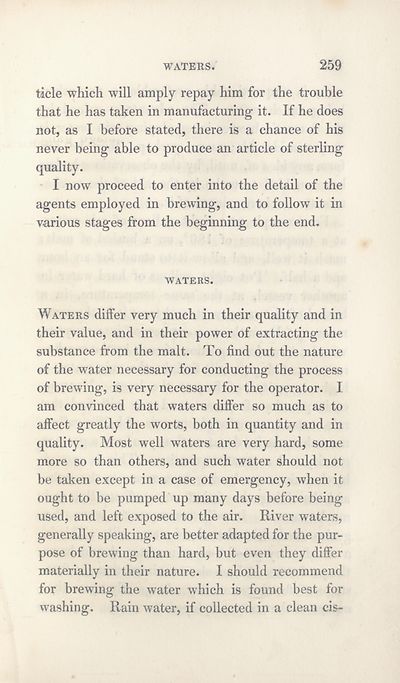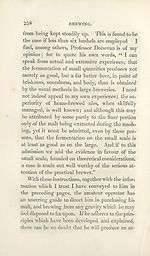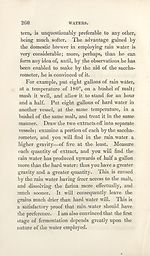Download files
Complete book:
Individual page:
Thumbnail gallery: Grid view | List view

WATERS.
259
tide which will amply repay him for the trouble
that he has taken in manufacturing it. If he does
not, as I before stated, there is a chance of his
never being able to produce an article of sterling
quality.
I now proceed to enter into the detail of the
agents employed in brewing, and to follow it in
various stages from the beginning to the end.
WATERS.
Waters differ very much in their quality and in
their value, and in their power of extracting the
substance from the malt. To find out the nature
of the water necessary for conducting the process
of brewing, is very necessary for the operator. I
am convinced that waters differ so much as to
affect greatly the worts, both in quantity and in
quality. Most well waters are very hard, some
more so than others, and such water should not
be taken except in a case of emergency, when it
ought to be pumped up many days before being
used, and left exposed to the air. River waters,
generally speaking, are better adapted for the pur¬
pose of brewing than hard, but even they differ
materially in their nature. I should recommend
for brewing the water which is found best for
washing. Rain water, if collected in a clean cis-
259
tide which will amply repay him for the trouble
that he has taken in manufacturing it. If he does
not, as I before stated, there is a chance of his
never being able to produce an article of sterling
quality.
I now proceed to enter into the detail of the
agents employed in brewing, and to follow it in
various stages from the beginning to the end.
WATERS.
Waters differ very much in their quality and in
their value, and in their power of extracting the
substance from the malt. To find out the nature
of the water necessary for conducting the process
of brewing, is very necessary for the operator. I
am convinced that waters differ so much as to
affect greatly the worts, both in quantity and in
quality. Most well waters are very hard, some
more so than others, and such water should not
be taken except in a case of emergency, when it
ought to be pumped up many days before being
used, and left exposed to the air. River waters,
generally speaking, are better adapted for the pur¬
pose of brewing than hard, but even they differ
materially in their nature. I should recommend
for brewing the water which is found best for
washing. Rain water, if collected in a clean cis-
Set display mode to:
![]() Universal Viewer |
Universal Viewer | ![]() Mirador |
Large image | Transcription
Mirador |
Large image | Transcription
| Antiquarian books of Scotland > Occupations > British wine-maker, and domestic brewer > (297) |
|---|
| Permanent URL | https://digital.nls.uk/126003485 |
|---|
| Description | Thousands of printed books from the Antiquarian Books of Scotland collection which dates from 1641 to the 1980s. The collection consists of 14,800 books which were published in Scotland or have a Scottish connection, e.g. through the author, printer or owner. Subjects covered include sport, education, diseases, adventure, occupations, Jacobites, politics and religion. Among the 29 languages represented are English, Gaelic, Italian, French, Russian and Swedish. |
|---|

